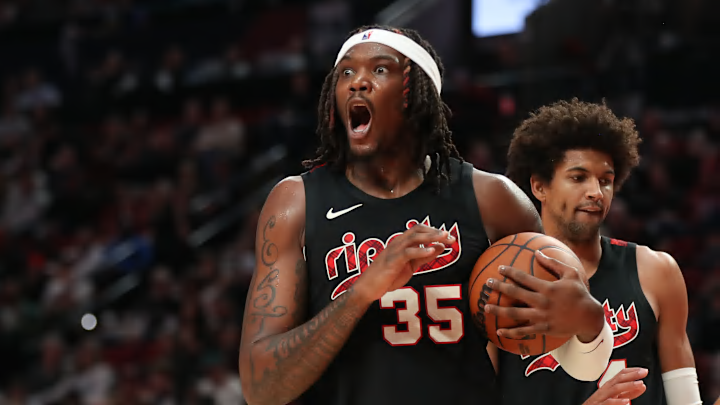The Portland Trail Blazers have one of the most crowded center rotations in the league. Even following the buyout of Deandre Ayton, Portland still has four center options in Donovan Clingan, Yang Hansen, Robert Williams III, and Duop Reath. Each center serves a unique purpose, giving head coach Chauncey Billups a lot of flexibility and adding multiple dimensions to the Blazers' frontcourt.
Clingan has the tools to become the best defender on Portland's entire roster and has already proven to be an elite rim protector in his rookie campaign. He provides them with a true defensive anchor, making this one of the league's toughest teams to score against.
Another first-round pick Portland invested in is Hansen, who is about as unique a player as they get in terms of skill sets for a center. The Blazers took a massive gamble on Hansen, taking a widely projected second-round pick with the No. 16 overall pick. He offers the Blazers something no other player does as an offensive hub with his elite court vision and ability to look over defenses.
On paper, this is all a perfect fit. The Blazers have two complementary centers to build around, another defensive weapon and lob threat in Robert Williams III, and a floor spacing big man in Duop Reath. However, there are serious concerns surrounding Portland's center rotation that many are overlooking.
Portland's center rotation isn't as deep as it appears
Clingan hovered around 20 minutes a game as a rookie, and was effective in an increased role down the stretch of last season. But he's still not quite at an optimal conditioning level. Clingan still needs to prove that he can maintain that level of play as a starter over the course of an 82-game season, especially considering he averaged 17.6 minutes per game at UConn.
Clingan is expected to start following Deandre Ayton's buyout, but that doesn't necessarily mean he'll get heavy starter-level minutes. And there are a lot more questions than answers behind Clingan.
We love that Portland took a flyer on Hansen because of his ceiling, but there's a world in which this selection still backfires. There's a reason he was a projected second-round pick, and it remains to be seen whether his game can translate from the CBA to the more physical and competitive NBA.
Hansen's defense is both a strength and a weakness as he can effectively contest shots at the rim, but his limited agility could be a liability, particularly in pick-and-rolls. NBA offenses are constantly hunting for mismatches out on the perimeter, and it's possible that Hansen won't be able to hold his own. If that is the case, it will limit the ceiling of Portland's defense, despite the defensive playmakers around him.
Offensively, Hansen had a huge turnover problem in the Summer League. Some of that can be attributed to playing with teammates who couldn't handle his wild passes. But how much of that is on him?
Hansen is a great pick, but we still don't fully know what Portland has or how much of a developmental project this is. Both things can be true.
That lack of clarity gets more problematic considering who's behind Hanen in the depth chart. Robert Williams III is one of the most unreliable players in the league, as injuries have unfortunately derailed his career. In the two seasons he's been in Portland, Williams has totaled 26 games. Even when he is healthy, Williams plays limited minutes and typically sits out back-to-back games. At this point, any contribution Portland gets from him is a bonus.
Then, there's Duop Reath. He's one of the best stories in the NBA, but quietly took a significant step backwards in his second season. Reath is undersized as a 6-foot-9 center and has to compensate for his lack of size in other departments, particularly as a floor spacer. But his shooting dipped to 32.1% from deep last season, meaning his weaknesses far outweighed his strengths.
Reath played just 10.2 minutes per game last season; there were even stretches throughout last season where Billups elected to play Jabari Walker or Deni Avdija at the five instead of Reath, as he wasn't providing enough.
Portland has a deep center rotation, but it's easy to pick apart flaws in each player's game individually. Hopefully, they address these concerns this season. But there are enough question marks surrounding this rotation that things could turn south much quicker than many realize.
